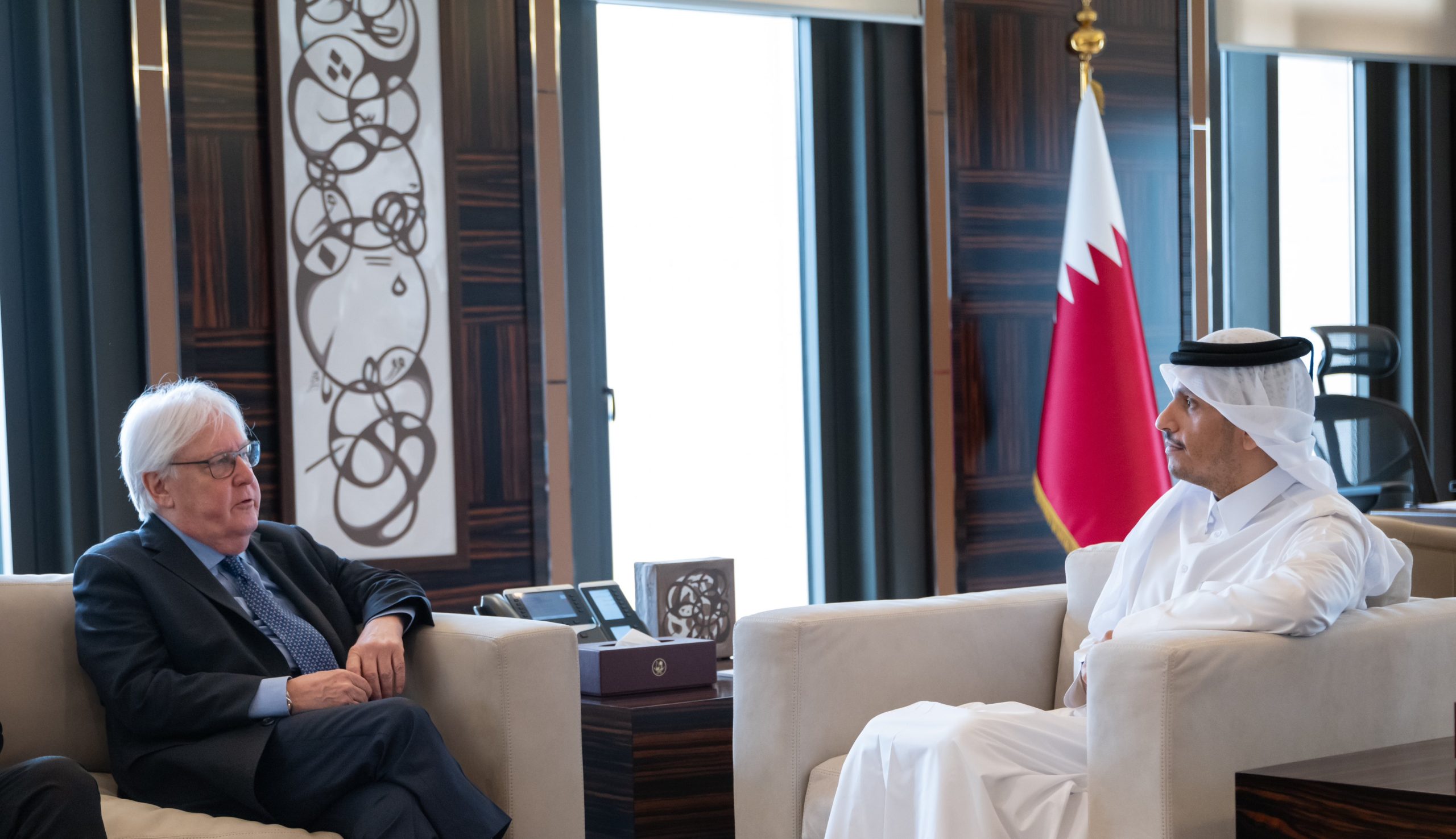Qatar has been working with its international partners to ensure the delivery of vital humanitarian aid to Gaza’s population as the situation worsens under Israel’s relentless genocidal war.
Qatar and the United Nations discussed joint efforts to provide “obstacle-free” aid to Gaza on Sunday, as the humanitarian crisis caused by Israel’s genocidal war threatens the lives of the Strip’s population.
The discussions took place in Doha between Qatar’s Prime Minister and Minister of Foreign Affairs, Sheikh Mohammed bin Abdulrahman Al-Thani, and UN Under-Secretary-General for Humanitarian Affairs and Emergency Relief Coordinator, Martin Griffiths.
Griffiths separately met Qatar’s Minister of State for International Cooperation at the Ministry of Foreign Affairs Lolwah Al Khater on the same day, where both sides also emphasised the need for a ceasefire in Gaza.
Sheikh Mohammed also stressed the need to address the dire humanitarian situation in Gaza and end the population’s suffering.
“The two sides discussed the latest developments in the Gaza Strip and the occupied Palestinian territories, and ways to bolster regional and international efforts for an immediate cease-fire in Gaza and to facilitate an obstacle-free humanitarian aid access to the Strip,” read a statement by Qatar’s foreign ministry.
Qatar has been working with its international partners to ensure the delivery of vital humanitarian aid to Gaza’s population as the situation worsens under Israel’s relentless genocidal war.
Since the beginning of the war on October 7, 2023, Israel killed at least 32,226 Palestinians while displacing more than 80 percent of the population. At least 31 people in Gaza, including 27 children, died due to malnutrition and dehydration, according to the latest UN figures.
Qatar dispatched 86 aid flights carrying 2,580 tonnes of aid that landed in Egypt’s El Arish before crossing into Gaza, according to the latest figures by Qatar’s foreign ministry.
The Gulf state has been among the vocal supporters of the UN’s Agency for Palestinian Refugees (UNRWA) since its largest donors cut off their funding. On March 6, Qatar pledged an additional $25 million to support the agency.
Last December, the Qatar Fund for Development and UNRWA agreed to a $18 million agreement for the year 2023-2024 to support Palestinian refugees amid the ongoing Israeli aggression in Gaza.
In January, at least 16 countries had decided to halt funding UNRWA after Israel accused 12 of UNRWA’s employees of allegedly being involved in Hamas’s surprise attack of October 7.
The countries represented $440 million of the agency’s overall funding, according to UNRWA.
Some countries have decided to resume funding the agency this month including Finland, Sweden, Canada, and Australia.
The United States, UNRWA’s largest donor, has maintained its refusal to resume funding the agency.
Last week, the U.S., House of Representatives approved a $1.2 trillion funding bill that would ban funding UNRWA. The bill, which saw a 286 to 134 vote, will go to the Senate.
The move came despite multiple reports debunking Israel’s allegations over the agency’s staff, which it has yet to prove as it continues its attacks on UN institutions in Gaza.
On March 14, Janez Lenarcic, the head of humanitarian aid and crisis management at the European Commission, said Israel has yet to present evidence to back its claims.
“UNRWA has reacted properly, immediately, effectively. It took several measures. There is an investigation. There is a review. We are satisfied so far with all this,” Lenarcic told reporters.
Meanwhile, last week, UN Secretary-General Antonio Guterres visited the Rafah crossing, where he documented a long line of truckloads of aid awaiting entry into Gaza. Guterres said that “horror and starvation stalk the people of Gaza.”
“Any further onslaught will make everything worse. Worse for Palestinian civilians, for the hostages, for all people of the region. It’s more than time for an immediate humanitarian ceasefire and the immediate release of all hostages,” he said on X.
Efforts to secure a ceasefire in Gaza have been ongoing, as indirect talks between Israel and Hamas continue to take place in Qatar.
Mediators Qatar, Egypt and the U.S. have been exchanging proposals between both sides, though the talks have yet to reach a breakthrough.
A sticking point has been the demand to reach a complete ceasefire in Gaza, which Israel repeatedly refused as it vows to expand its operations to Rafah. Israel has also continued the deadly raid at the Al-Shifa Medical Complex in Gaza for more than a week.







